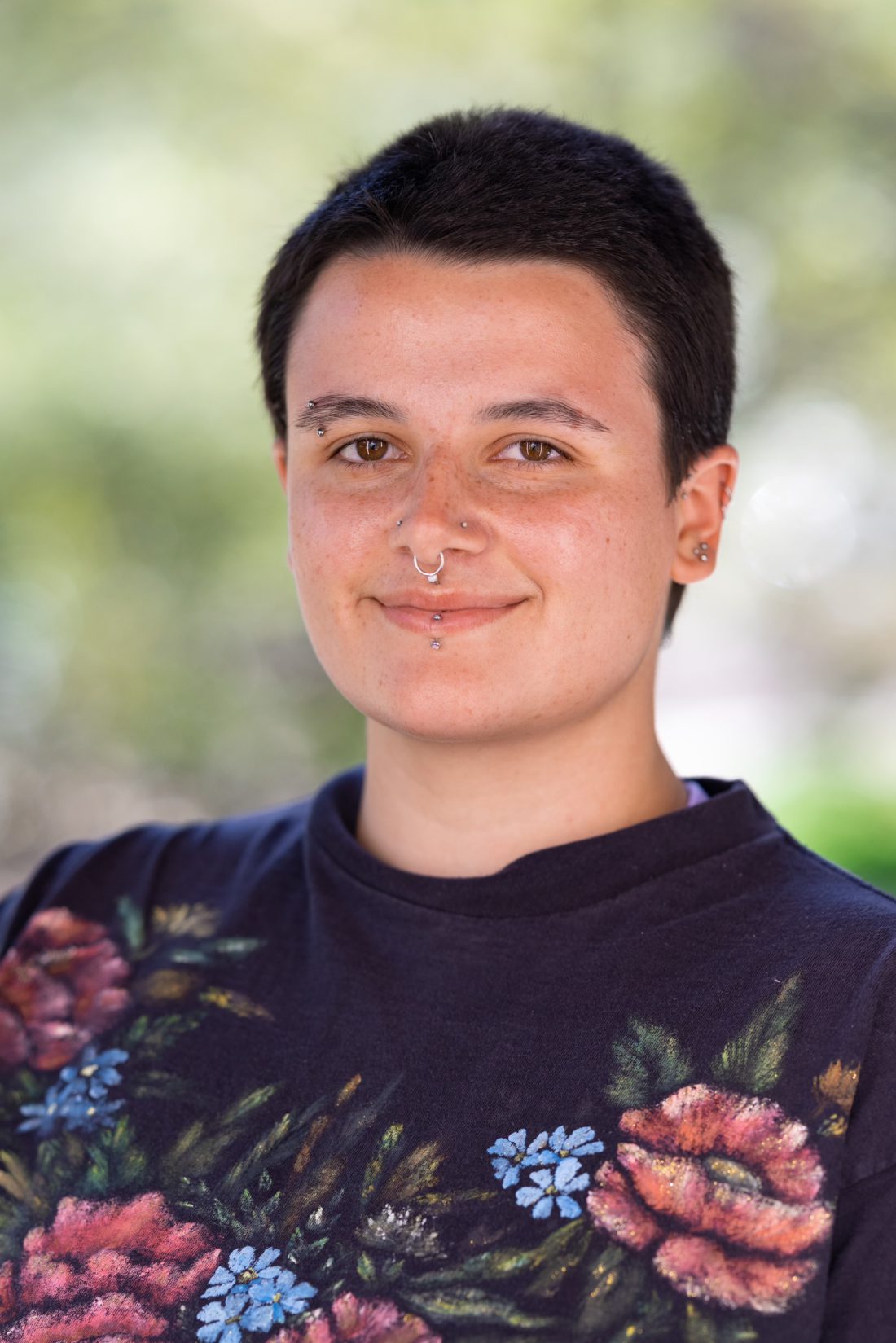Mars Zappia embodies their activism. “It’s what I find the most valuable in life, being able to help people,” they say. “Seeing people thrive is what I’m passionate about.”
A sophomore at UNC Asheville, Zappia recently received the Community Impact Student Award from the N.C. Campus Engagement network in recognition of their outstanding leadership and service to the campus and community.
As a climate analyst with the Office of Sustainability, Zappia works on the Climate Action Plan, which aims to have UNCA carbon neutral by 2050. Zappia helped the engineering department with its mission to put solar panels on campus buildings while also educating people about solar power and microgrids.
In their work with the Student Environmental Center, Zappia cultivates the ROOTS Garden, the largest on the UNCA campus. Here, their efforts include hands-on gardening, educating volunteers and working with professors to facilitate mini-workshops for students and community members.
Through the Key Center for Community Engaged Learning, Zappia began working on a research project focusing on abortion history in WNC in December 2021.
Xpress squeezed into Zappia’s busy schedule to discuss food security, solar panels and tips for home gardeners pursuing sustainability.
This interview has been condensed and edited.
Xpress: How are gardening and food security connected?
Zappia: We’re living in a world where any produce we get from grocery stores is widely industrialized. We’re asking for fresh foods in high volumes in times of the year when it’s not necessarily meant to be grown. The price of those foods is getting higher and higher because of demand, and they’re becoming less accessible.
When you add the layer of climate change and how different environments in the world are changing, that’s forcing us to rethink how we’re growing food. We need to educate people how, even just inside their own houses, they can set up their own little garden and have fresh lettuce. As the climate continues to get warmer, gardening is very important for your own sustainability and your community.
What sustainable practices do you recommend for home gardeners?
The biggest thing is composting. At UNC Asheville, we have a focus on recycling and composting on an industrial level. In the gardens, we are able to compost any weeds that we pull or crops that we harvested too late. Having the ability to take your waste and turn it into something that is a very good soil amendment is awesome. You’re not wasting anything. And it’s pretty easy to do from home. There’s a bunch of different setups that you can do. My partner and I compost in our apartment, and I bring it to the ROOTS Garden.
Finding gardening space between your current landscaping areas is a very feasible option. Sometimes gardeners have big fancy setups, and people who are introducing themselves to gardening get intimidated. If you think you have to have a certain amount of space or tools to get started, it’s very expensive. But there are cheaper and sometimes free ways to do it. There are many seed libraries in the Asheville area and community centers that give out seeds for free. You can find people who have chopped down trees at their houses and are giving away mulch for free. There’s a lot of things that you can find in the community that help improve your soil quality.
What is the impact of the solar panel project on the UNC Asheville carbon commitment?
A common misconception is that solar panels will completely green your grid and do maybe 50% or 60% of the work, when in actuality it’s probably more like 15% to 20%. But it’s still a very important step. When you’re talking about the social cost of carbon and how much things are costing, our emissions between now and 2050 are going to increase instead of staying steady if we continue with business as usual. Although it’s a small percentage, those solar panels are decreasing our greenhouse gas emissions and helping us become carbon neutral, especially in the context of microgrids and how that relates to climate resiliency.
What guidance would you offer young adults interested in getting more involved within their community?
I would say that there is never too little or too much support that you can provide to your community. Any amount of action is action. Having conversations with people in your family about issues that you’re passionate about that have political high stakes in your community — those conversations are action. A lot of the time, people try to quantify the amount of advocacy work that they’re doing. That is nonsensical because we’re all working toward the same thing.




Before you comment
The comments section is here to provide a platform for civil dialogue on the issues we face together as a local community. Xpress is committed to offering this platform for all voices, but when the tone of the discussion gets nasty or strays off topic, we believe many people choose not to participate. Xpress editors are determined to moderate comments to ensure a constructive interchange is maintained. All comments judged not to be in keeping with the spirit of civil discourse will be removed and repeat violators will be banned. See here for our terms of service. Thank you for being part of this effort to promote respectful discussion.